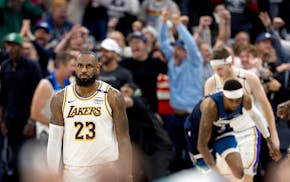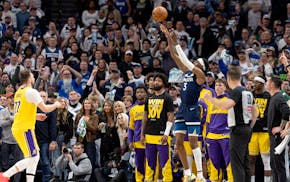Darius Taylor took the handoff and ran parallel to the line, scanning for an opening. The Illinois defense sniffed out the third-down play, which seemed destined to end in a tackle for loss.
Taylor wasn't fazed. He planted his foot and darted upfield, turning nothing into something positive — a 7-yard gain for a first down that extended the drive and led to a field goal in the Gophers' 25-17 win last Saturday.
That single run highlighted traits that make Taylor a special talent as a true sophomore running back. Patience, vision, balance, burst.
"On that play, I was setting it up," Taylor said Wednesday in a conversation at the athletic facility. "I was stretching out the defense for a second and waiting for that opportunity to make that cutback. I felt a guy coming off my back side, so I had to speed it up. That's why it looked so drastic. There was a guy chasing me from behind."
Taylor eluded Illini tacklers time and again by relying on two skills that are putting Big Ten defenses in a bind: cutback runs and catches out of the backfield.
The emergence of Taylor as a viable receiving option in the Gophers' new-look offense has made him one of the most versatile running backs in college football. He ranks top 10 in the Big Ten in eight statistical categories and 20th nationally in yards from scrimmage.
The Gophers program has produced a string of elite running backs over the past quarter-century. Each had a style that was exceptional and identifiable. Laurence Maroney's explosiveness, Marion Barber III's power, David Cobb's toughness, Mohamed Ibrahim's stamina.
Taylor's hallmark is his vision in finding creases amid a mass of bodies colliding in front of him.
"He's got incredible vision, unlike anything I've seen or any running back I've played with," offensive lineman Quinn Carroll said. "When he sees that hole and hits it, he's going to make it right. He's just that special of a talent."
Asked to name Taylor's best trait as a runner, quarterback Max Brosmer picked two that work in concert: vision and patience.
"When we're in shotgun and I can see the holes he's hitting," Brosmer said, "he's got amazing vision. I don't know how he sees it."
So often Taylor will take a handoff, run to his left or right, draw the defense that direction, then cut back to the other side for a positive gain. Taylor credits that sleight of hand to coaching and his own innate feel for the game.
"You have freedom within the confines of the run," he said. "If that's what's open, you take what you can."
Gophers coaches expanded Taylor's role this season by incorporating him in the passing game, unlocking a new, impactful facet of the offense. He already has 43 catches, which leads Power Four running backs, and is just nine shy of the Gophers' single-season record of 52 for that position set by Chuck Rios in 1994.
Taylor played wide receiver in high school until midway through his junior year, so catching passes was not a major adjustment. Adding that dimension to the offense creates mismatches with defenders assigned to cover Taylor and gives Brosmer an outlet on check-downs.
"That's part of our job as being good coaches," offensive coordinator Greg Harbaugh Jr. said. "It's putting the ball in playmakers' hands and utilizing their skillset."
The payoff has been a more dynamic offense that is harder to defend. Taylor's 10 total touchdowns are second-most in the Big Ten.
"The greatest thing is I'm getting the ball in many different ways," Taylor said. "I'm able to showcase what I can do and help the team in many different ways. It keeps the defense on their toes. It does a lot to open up the run game and also open the passing game for the receivers. [Defenses] have to respect the check-down as well as the downfield throws."
Great players command attention but still find a way to be productive. Just like that third-down run at Illinois, Taylor has a gift for being a step ahead. He spotted his opening and took it.
Scoggins: Two great players cannot overcome a very good team
Scoggins: Wild are familiar with playoff regret, but Game 5 loss is especially regrettable

Scoggins: Redick's no-sub second half looked desperate, appears damaging

Scoggins: Wild begin a test of resilience after sudden setback

